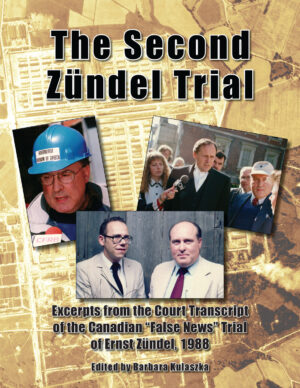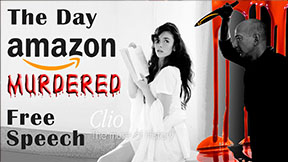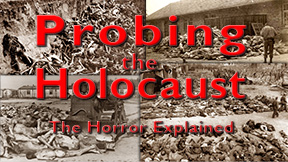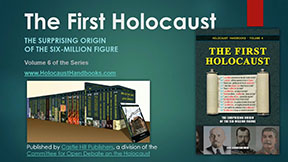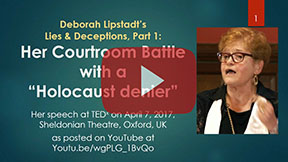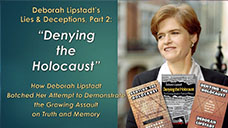Thirty-one years have passed since the Second Zündel Trial ended. Many of the key players have since passed away, among them Ernst Zündel himself (†2017) and his spiritus rector Prof. Dr. Robert Faurisson (†2018), who was the mastermind behind these trials, as well as Zündel’s defense counsels Douglas Christie (†2013) and Barbara Kulaszka (†2017). Nevertheless, these historic trials keep having an impact as if they had happened just yesterday.
While the First Zündel Trial of 1985 was extensively covered by the Canadian news media, and to a much lesser extent also by the U.S. media, the second trial, although much less covered by the mass media, had a much greater impact internationally, mainly due to the Leuchter Report as the first independent forensic research performed on the Auschwitz and Majdanek camps.
One reason for the Leuchter Report’s initial success was that it was endorsed on the witness stand by the British best-selling historian David Irving, who a year later even issued his own glossy edition of that report featuring his own introduction. Subsequent to his endorsing the Leuchter Report, however, David Irving lost many of his book contracts, to no small degree as a result of Jewish pressure groups bullying publishers worldwide to take Irving’s books off their lists and to refuse to take on any of his new books.
Unwilling to take this censorship lying down, Irving fought back by suing one of the greatest among the bullies, Deborah Lipstadt, for libel. Although Irving lost the ensuing civil lawsuit in 2000,[1] it brought revisionism again into the spotlight of the media and fueled interest in revisionism among many who had either never heard of it or who considered it a mere fringe occurrence.
After David Irving’s defeat in court, the Holocaust orthodoxy declared total victory over Holocaust revisionism. What they didn’t understand – or were hiding from public view – was the fact that David Irving had never published anything about the Holocaust. He even prided himself in never having read a single book about it, revisionist books included. In other words: although David Irving had endorsed the Leuchter Report, he was anything but an expert in Holocaust studies, let alone a Holocaust revisionist. Hence, targeting him had very little to do with targeting Holocaust revisionism, if anything. Victory over Irving was therefore even less than a Pyrrhic victory; it was a knockout in a match of shadow boxing. It left Holocaust revisionism completely unscathed.[2]
When it comes to defining and revising the Holocaust narrative, the real battle was joined in 1991 in Germany. At its epicenter was a young student of chemistry who at that time was preparing his PhD thesis in solid-state research at a Max Planck Institute in southwestern Germany. He had stumbled upon the Leuchter Report and had found it both intriguing but also wanting. Hence, applying his training as an exacting scientist, he set out to test what Leuchter had discovered. Because this young student had no formal training in history, engineering and other academic disciplines potentially involved, however, he felt sorely inadequate to tackle the interdisciplinary challenges he faced when venturing into this field. He started to contact specialists in other fields – lawyers, engineers, historians, geologists – and suggested writing an anthology that would feature the most up-to-date research results on many aspects of the Holocaust.
This anthology duly appeared in 1994 in the German language,[3] and then, six years later, also in an expanded and updated English edition: Dissecting the Holocaust.[4] This English edition was also the first volume of a new series this young student launched to create a compendium that would cover, in many monographs, the many aspects of the Holocaust in a very thorough, scientific manner.
As I write these lines, this series titled Holocaust Handbooks has 38 volumes, with more slated to appear over the next few years (see www.HolocaustHandbooks.com). Most of these monographs are based on decades of research conducted in archives all over the world. They are heavily footnoted and referenced. In contrast to most other, usually mainstream works on this issue, the tomes of this series approach their topic with the exactitude and critical attitude called for by the subject.
Over the years, this series that grew from the seeds sown by the Second Zündel Trial has increasingly become the center of the Holocaust controversy raging in the underground which mainstream scholars, if only out of self-preservation, pretend does not exist. In fact, the orthodoxy wants this series to disappear so badly that they have resorted to almost anything to make it go away. In 2017, they succeeded in pressuring Amazon.com to completely ban the entire series, plus a large number of other revisionist books, the original edition of the present book included.[5] The latter is also the reason why we decided to put it back in print – just to resist…
YouTube, bullied by a certain “community” of traditional enemies of free speech, regularly bans or blocks documentaries based on these scholarly books. In 2013 and again in 2019, the Lobby even made sure that the publishing company of this series, established in 1998 by the PhD student mentioned earlier, had its credit-card processing contracts cancelled, with no warning given, leaving them for a short while with virtually no income.
While Ernst Zündel ultimately won his legal case when Canada’s Supreme Court declared as unconstitutional the law under which Zündel had been prosecuted, most revisionists following in Zündel’s footsteps in the decades that followed were not that fortunate. In fact, since the Second Zündel Trial – and to no small degree certainly as a result of it – 20 European countries have introduced new penal laws outlawing Holocaust revisionism in one form or another.[6] Ever since, revisionists have been serving time for their dissident writings, among them Ernst Zündel himself (in Germany), Fred Leuchter, David Irving, Udo Walendy and, yes, also the above-mentioned German student, to name only a few.
In spite of all the adversity, Holocaust revisionism keeps making progress, both academically and by finding an ever-expanding audience in a public that grows increasingly weary of the incessant propaganda it is fed with by the orthodoxy. They use this propaganda to curb freedom of speech and assembly, and to justify conflict and war on a global scale.
* * *
When reading the present book, please be aware that more than three decades have passed – three decades of progress in research which would invite correcting quite a few of the statements made during the Second Zündel Trial. Since the present book is a historical record of a historic trial, we have refrained from updating any of it in light of later research and discoveries. Its text is the same as it was when first published by Barbara Kulaszka in 1992 – save for a few corrected typos and a few added footnotes.
In 1988, the body of revisionist literature was rather slight. Apart from Arthur Butz’s Hoax of the Twentieth Century, there was not much anyone could have called upon. That has changed drastically, not least due to the series Holocaust Handbooks which, due to its mere existence, is an inspiration to scholars worldwide to keep working and keep contributing.
When reading about any particular topic in the present book, the reader should keep in mind that our knowledge has progressed, and that it is advisable to consult the pertinent volume of the Holocaust Handbooks for any topic you would like to learn more about. For instance, they include a monograph dedicated exclusively to Leuchter’s various expert reports (Vol. 16). Key witnesses such as Rudolf Höss, Miklos Nyiszli and Filip Müller have their own dedicated monographs (Vols. 35, 37, 43). Each so-called extermination camp has its own monograph (Vols. 4, 5, 8, 9, 19, 23), with one of them – Auschwitz – being dealt with in multiple specialized studies, including one scrutinizing the 30 most-important witness accounts. To learn more about them, just turn to the end pages of this book, or visit www.HolocaustHandbooks.com. I am not saying this in order to boost the sales of these books, because almost all of these books are available as e-book downloads free of charge! So you need neither spend money nor identify yourself when downloading them. Of course, they’re also available in ink on paper.
Oh, and the PhD student who got all this rolling after learning about the Leuchter Report is now himself 54 years of age.
Myself.
Germar Rudolf, April 3, 2019
[1] See Don D. Guttenplan, The Holocaust on Trial: History, Justice and the David Irving Libel Case (London: Granta Books 2001); Deborah E. Lipstadt, History on Trial: My Day in Court with David Irving (New York: Ecco, 2005)
[2] For this, see the analysis by Carlo Mattogno, The Real Case for Auschwitz: Robert van Pelt’s Evidence from the Irving Trial Critically Reviewed (Uckfield: Castle Hill Publishers, 2015).
[3] Ernst Gauss (ed. = Germar Rudolf), Grundlagen zur Zeitgeschichte: Ein Handbuch über strittige Fragen des 20. Jahrhunderts (Tübingen: Grabert, 1994).
[4] Ernst Gauss (ed. = Germar Rudolf), Dissecting the Holocaust: The Growing Critique of ‘Truth’ and ‘Memory’ (Capshaw, Ala.: Theses & Dissertations Press, 2000); a new edition is in preparation.
[5] Barbara Kulaszka (ed.), Did Six Million Really Die? Did Six Million Really Die? Report of the Evidence in the Canadian “False News” Trial of Ernst Zündel – 1988 (Toronto: Samisdat Publishers, 1992). Try pulling it up on Amazon using its ISBN number: https://amazon.com/dp/1896006000 – all you’ll see is a photo of some apologetic puppy. So cute…
[6] Austria, Belgium, Czechia, France, Germany, Greece, Hungary, Liechtenstein, Lithuania, Luxemburg, Netherlands, Poland, Portugal, Rumania, Russia, Slovakia, Spain, Switzerland, UK. The Spanish Supreme Court revoked this law, while the applicable Italian and British law requires that “denial” be committed together with defaming the victims. The Russian law, worded similarly to the French, has not yet been enforced.

